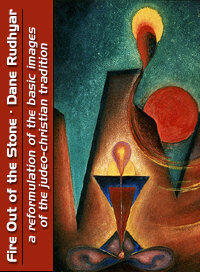 |
| Home | Bio | Art | Music | Literature | Civilization & Culture | Philosophy of Wholeness | Theosophy & Spirituality | Astrology |

FIRE OUT OF THE STONE A Reformulation of the Basic Images of the Judeo-Christian Tradition by Dane Rudhyar, 1962 1. Not to Repeat, But to Renew 2. The Essence and the Substance 3. To Become "More-Than-Man" 4. The Fatherhood of God 5. At the Center is Soul 6. Creation and Evolution 7. Crisis and Sin 8. The Coming-Together of God and Man 9. Christ-Love: The Covenant with Individual • Page 1 • Page 2 • Page 3 • Page 4 • Page 5 10. The Life of Mediation and its Paradox
: : :
This title was first published by Sevire, 1963. Cover for the online edition copyright © 2008 by Michael R. Meyer. : : : : : :
"Thy God is a cosumming fire." Duet. 4:25 "He shall baptize you with the Holy Spirit and with fire." Matthew 3:11 "I am come to send fire on the earth." Luke 12:49
: : :
|

9. CHRIST-LOVE - page 2The Covenant with Individuals"To the weak became I as weak that I might gain the weak: I am made all things to all men, that I might by all means save some." I Corinthians 9 : 22 The Divine BelovedJesus refused to be a father-Image to his disciples, or to any one. He refused both the fatherhood and the kingdom of "this world". He spoke to individuals, not to a society. Unlike Moses and Mohammed or more recently Baha'u'llah in Persia and Palestine (the Bahai Faith and its "World Order"), he left no system to deal with collective problems; he produced no plan for either a limited or a universal society. His Gospel is addressed solely to individuals. His message refers to internal realizations in consciousness, and a new quality of individual behavior based on a universalistic principle of human relationship ("love", agape) — the new factor in human evolution. Jesus presents no outer form, except possibly the Prayer he gave. But even this Prayer states only what the individual needs, and needs to realize, in relation to a "Father" who is in that "Heaven" which, as Jesus constantly stresses, is within everyone regardless of race, tribal taboos or social forms. The Father is "ours"; even he, Jesus, does not separate himself from all other men. What he does, his disciples can do; yes, and even more. If he refuses to accept the Father-Image of his followers, what then does he represent? The answer can only be: the Beloved. He is, as Christ, the Beloved of mankind. He comes to supersede the Father, whose formalistic, authoritarian and rigid rule — once distorted, dogmatized and made into instrument of psychic and/or social oppression by priests and churchly privileges — has kept individuals in fear. Evidently such a fatherly rule steadies or solidifies usefully the over-all collective order of society, when society is based on tribal or quasi-tribal patterns of human relationship. But the central message of Jesus' Gospel is that this type of society and these biological-psychic foundations for human relationship have become obsolete. "Behold, I make all things new!" — not all at once evidently, but in principle, in the creative Word. Alas, what have the Churches made of the Beloved! They have built around His name either a hierarchy topped by a Father (Pope, "little Father", pappas), or the literal worship of a "Book" — a well-known psychological substitute for a Father-Image. They have quenched with "holy water" and watery devotionalism the flaming fire of the divine Beloved. I repeat, paternalistic rules and traditions are necessary to protect the tender stages of the early growth of human persons; but they no longer make sense to those who have come face to face with the Beloved, and in whom He radiantly abides as a fire of unquenchable, but ever-focused, ever personally applied divine love. All true love must operate through a person; but if that person tightly hugs that love which surges through his or her inmost heart, and emotionally binds it to the consciousness and feeling-nature; if that love's intensity is stepped down into devotion to a human or theistic fetish; if it ceases to fulfill the need of the being for whom it is meant as a healing, redeeming gift — then it is no longer love born of spirit and it becomes mere passion or sheer lustfulness. It may also become, at so-called higher levels, a power of psychic enslavement in the name of "religion" or "religious salvation". Jesus, the Christed Lover, because he loves divinely, heals and redeems individuals. As a power of spirit, one can only love individuals; only the love of individuals can be focused enough to be spiritual, in the real sense of this word. But just because this love is directed toward individuals, that is, to any individual who calls for it with the strength of a need that is open to receive an answer — because of this, it is universal love. If you love your kin (the members of your family, your tribe, your culture) because of this kinship, this is not universal love. If you love your mother, father or siblings more than the stranger whose need should summon forth from within your innermost heart the love that heals and redeems, then you are not a "disciple of Christ". Jesus indeed enjoins you to "leave behind" or even "hate" father, mother and all forms of blood kinship; to take up your Cross (symbol of total individualization and separation from collective patterns of relationship) and to follow him. His disciples and followers, and they alone, are his mother and brethren. He left the Mother-Image and received the power of the Fatherhood, but only to renounce all the externality and authority of concrete fathers and to polarize within his own vibrant individuality the fire of divine love. To everyone who is ready, willing, and truly open to the "gift-waves", he is the Beloved. But he must be consciously accepted as the divine Lover in the light of self-revelation — unlike the Eros of Greek mythology who is never to be looked at and should only be received in the night, in the unconsciousness of instinctual love. The love that is spirit-in-act must be met consciously; it must be called forth in humility and in the silence of a heart whose infinite anguish and perhaps despair have drawn from it all physical blood-spirits. Christed love heals and redeems what is left of the darkness of the past; it makes all things new — as the fabled phoenix is new that rises from its own ashes on the empty altar where once fire was raging. The Old Testament becomes the New Word: "Love ye one another as I have loved you." In this Christed love the individualized person, having "become separate" from all the past that bound him, realizes himself as "a universal", ready to serve and to love wherever and whenever needed, without fear and without lasting attachment — leaven to lighten up the heavy dough of human emotions, sower of seed for the soul ready to receive the gift of tomorrows that sing.  Home | About | Calendar | Ephemeris Charts | Art Gallery | Library | Resources Shop | Rudhyar Archival Project | Help Web design and all data, text and graphics appearing on this site are protected by US and International Copyright and are not to be reproduced, distributed, circulated, offered for sale, or given away, in any form, by any means, electronic or conventional. See Notices for full copyright statement and conditions of use. Web design copyright © 2000-2004 by Michael R. Meyer. All Rights Reserved. |